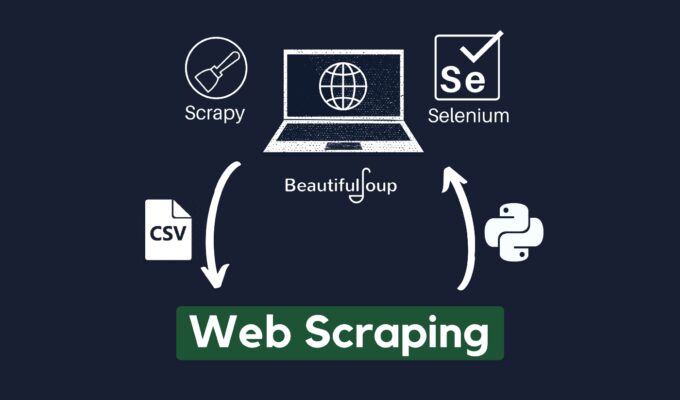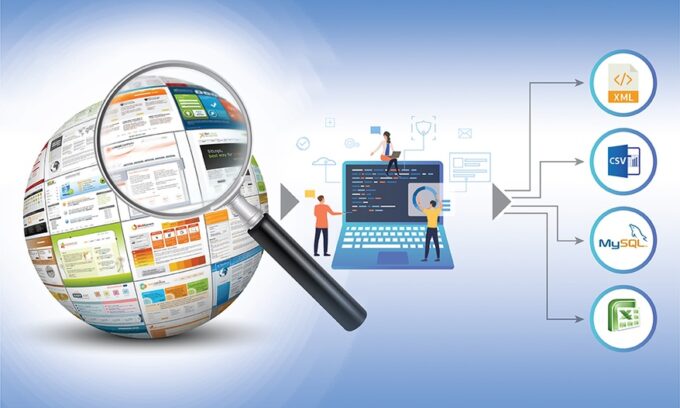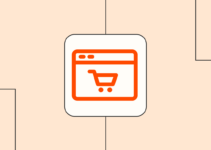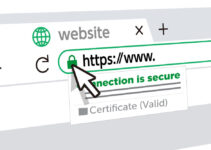Web scraping, also known as crawling, is well known for delivering the right amount of data to anyone looking for it. And because of how fundamental data has become, every brand in every industry should be interested in it.
For instance, data is now considered the single key to a brand’s growth or collapse, with brands that make it a priority to collect data frequently seeing unprecedented growth while those who ignore this simple item end up folding up and closing their doors permanently.
This is because the decisions that keep the profits growing and the revenue coming must be backed by accurate data collected in real-time. And this is something you can do through web crawling.
But while scraping can give you the chance to collect as much data as you need, we know that it is not without its disadvantages and challenges.
So as we consider the many blessings of web crawling, we will also check out some of its most common disadvantages.
What Is Web Scraping?

Source: medium.com
Scraping can be defined as one of the common ways to use specialized tools such as proxies and crawling bots to interact with several sources and collect data repeatedly.
It is an automated process that helps brands harvest enormous amounts of data from different sources such as e-commerce marketplaces, social media platforms, and search engines.
The process needs to be automated because it is repetitive, and this can be draining if done otherwise.
The tool proxy helps to take the requests and deliver them on behalf of the user while dishing out multiple internet protocols (IP) addresses and locations. This is crucial both for the user’s security and to allow the process to flow smoothly without getting hit with a ban after repeating the same IP.
The second tool, the web scraping bot, is essential for interacting with the data source extracting the necessary information, and then returning said information to the user where it is parsed, transformed, and stored for immediate or future use.
Together, these tools make crawling possible and easy as well. And without them, it would be practically impossible to perform such a large-scale operation.
How Does Web Scraping Work?
The process of crawling is straightforward and can be described as thus:
- You send out a request to a target server with the information you need
- The request is routed via the proxy you use to give you anonymity and security
- The proxy also clear the path of any restrictions so the web scraping bot can make its way to the server
- The crawling bot reaches the server and extracts the data from it, and returns it through the proxy
- The proxy scans the data and checks for malware before displaying it to you
- The data is parsed and transformed before it is stored in any available storage system
- The process is repeated as often as it is necessary to frequently collect important data that can be used to back up decisions.
Pros and Cons of Web Scraping

Source: getblogo.com
Some of the advantages of web scraping are as follows:
1. It is Cost-Effective
Crawling can help you save costs while gathering data. Information extraction is generally an intensive project and requires a large budget to succeed.
Yet the combination of proxies and web scraping bots to perform this task repeatedly and automatically helps to ensure that you save a lot of money in the end.
2. Data Accuracy
Manually collecting data isn’t only overwhelming, but it can end in very inaccurate results. When a human collects information, more errors can occur when compared to when an intelligent machine is allowed to perform such an important task.
Also, manual data extraction is slow and often lags in real-time. This means the information can never be accurate enough to explain what is currently happening in the market.
3. Speed
Speed is considered one of the biggest advantages of collecting data with sophisticated tools. Not only does crawling deliver required info in real-time, but it also helps to save you valuable time that can be channeled into other areas of growing the business.
4. Ease of Implementation and Maintenance
Another advantage of web scraping is how easy the tools are to set up. If you decide to work with third-party tools, they can be implemented and run by their dedicated team, or you can invest in owning them and running them inside your organization. Either way, setting them up is relatively easy and requires minimal technical know-how.
The tools are also very easy to maintain, requiring only a few maintenance and upgrades after extended use.
Cons of Web Scraping

Source: innovationmanagement.se
The following are some of the disadvantages of using web scraping:
1. It Takes A Complex Process
Web scraping may not be as easy as it sounds as it constitutes many different processes. For instance, after extracting the data, it still needs to be treated, analyzed and visualized before creating any meaningful impacts.
2. Scraping Policies
Web scraping is legal, yet it may break specific rules employed by a particular website.
This even leads some websites to use measures that detect repeated tasks and bot activities and promptly block them.
Examples of Industries Where Web Scraping Is Most Useful
There are several industries and areas where web crawling is not only necessary but crucial, and they include the following:
- E-commerce businesses use it to collect statistics about the market, prices, and competition
- Social media management also involves scraping to collect and monitor comments and conversations
- Real Estate brands also need web scraping to gather useful data like property listing, customer sentiments, and buyer’s information.
- Travel and Tourism companies and managers need a steady flow of information to stay on top of the market and have key insights that help understand destinations and travelers.
- The job posting and employment industry also need web scraping to benefit employers and job seekers.
Web Scraping Job Postings

Source: expertise.jetruby.com
Job statistics is becoming increasingly important because it provides value for people on both ends; employers and potential employees.
Employers can use these statistics to know all they need to know about a potential hire, thereby helping them make the most informed pick.
And job seekers can use collected data to know what companies are hiring, where there are great opportunities, and how to take advantage of those opportunities fully.
In addition to all these, country governments can use job information to learn about their country’s employment/unemployment rates and make better policies in that regard.
Web scraping offers the advantage of using highly sophisticated tools to harvest large quantities of data that can be used to provide job aggregation websites with sufficient and relevant data. This gives companies enough data to analyze to understand job trends and improve their recruitment strategies.
Job seekers are also a prime example of how web scraping can provide relevant information since it allows the seekers to know which specific companies they ought to apply to. For more information on web crawling job postings, click here.
Conclusion
Data is undoubtedly one of the most important commodities today and is useful in every industry, including job postings and the recruitment industry.
Web scraping job postings is an efficient way to gather information quickly and economically for the benefit of companies, governments, and individuals.







